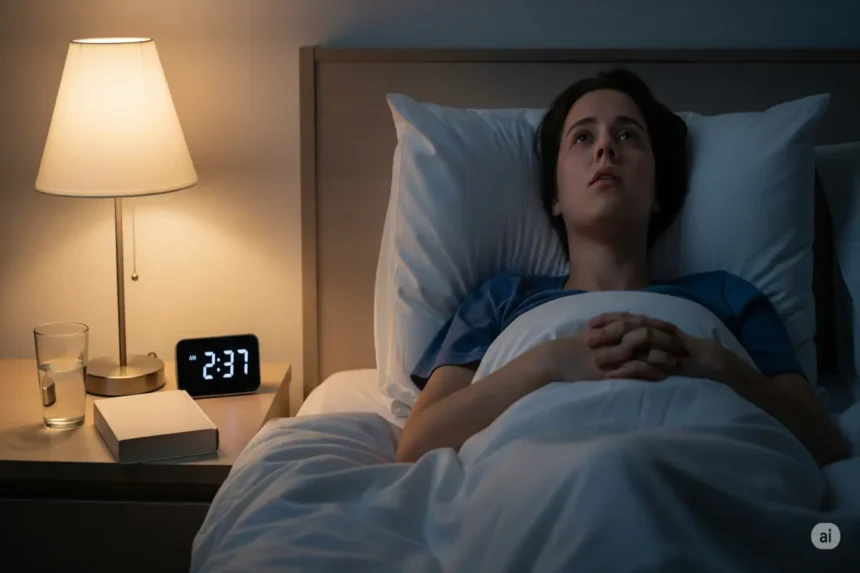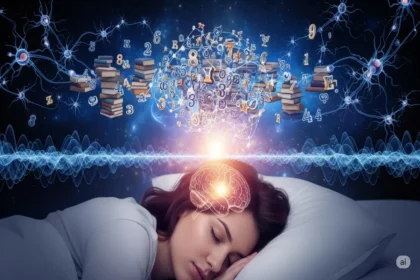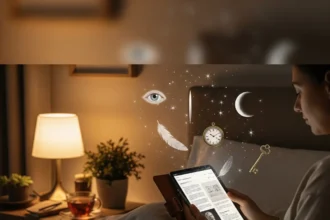Is insomnia a familiar, unwelcome guest in your nights? Do you find yourself staring at the ceiling as the hours tick by, dreading the dawn, only to feel like a zombie when it finally arrives? You’re certainly not alone. In a world that often celebrates constant productivity and perpetual motion, sleep often feels like a luxury rather than a fundamental biological need. Yet, its absence, particularly in the chronic form of insomnia, doesn’t just make us feel tired; it erodes our physical health, dims our mental sharpness, and frays the very fabric of our emotional well-being. It’s a silent thief, pilfering not just hours from our nights, but vitality from our days.
For years, I treated sleep as a negotiable item. A late-night deadline? Sure, sacrifice a few hours. An early morning flight? No problem, I’ll catch up later. But “later” rarely came. The cumulative effect was a constant low hum of fatigue, a fogginess that clung to my thoughts, and an irritability that often surprised even myself. It wasn’t until a particularly grueling period, marked by sustained, severe sleep deprivation, that I truly grasped the profound impact of this invisible ailment. My own experience, coupled with countless conversations with sleep specialists and individuals who have navigated the labyrinth of sleeplessness, has made one thing abundantly clear: reclaiming your nights isn’t just about getting more sleep; it’s about reclaiming your life.
The Science of Slipping Away: What Insomnia Does to Us
To understand how to reclaim our nights, we first need to appreciate what’s being stolen. Sleep isn’t merely a period of inactivity; it’s a dynamic, essential process during which our bodies and minds undertake critical restorative work. During deep sleep, growth hormones are released, cellular repair accelerates, and our immune system gets a crucial boost. REM sleep, on the other hand, is vital for cognitive function, memory consolidation, and emotional regulation.
When insomnia takes root, these vital processes are disrupted. Dr. Matthew Walker, a renowned neuroscientist and author of “Why We Sleep,” eloquently describes sleep as our “life-support system.” He highlights how chronic sleep deprivation significantly increases the risk of numerous health problems, from cardiovascular disease and diabetes to weakened immunity and even certain types of cancer. Beyond the physical, the mental toll is immense. Studies have repeatedly linked insufficient sleep to impaired concentration, poor decision-making, mood swings, and an exacerbated risk of anxiety and depression. Imagine trying to run a complex computer program on a constantly crashing system – that’s essentially what we ask our brains to do when we deny them adequate rest.
Consider the case of Anya, a brilliant architect I met during my research. For months, Anya had been struggling with initial insomnia – the inability to fall asleep. Her mind would race with design ideas, client demands, and an endless loop of “what-ifs.” The consequence? Her creativity, once her superpower, began to wane. Her attention to detail, a hallmark of her work, suffered. “It was like trying to draw a straight line with a shaky hand,” she confided. “My passion was there, but my brain just couldn’t keep up. I was constantly on edge.” Anya’s story isn’t unique; it’s a common lament among those whose professional and personal lives are slowly undermined by the pervasive shadow of sleeplessness.
Reclaiming Your Nights: 7 Proven Strategies
The good news is that while insomnia can feel insurmountable, it is often treatable. It requires a commitment to understanding your body’s unique rhythms and implementing scientifically-backed strategies. Here are seven proven approaches that can help you reclaim your nights and rediscover the profound benefits of restorative sleep:
1. Embrace a Consistent Sleep Schedule (Even on Weekends): Our bodies thrive on routine, and our internal clock, the circadian rhythm, is no exception. Going to bed and waking up at roughly the same time every day, even on weekends, helps to regulate this rhythm. Think of it like setting a precise internal alarm clock. When you deviate wildly, especially with weekend “catch-up” sleep, you essentially induce social jet lag, confusing your body and making it harder to fall asleep when Monday rolls around. Start by gradually shifting your bedtime and wake-up time by 15-minute increments until you reach your desired schedule.
2. Optimize Your Sleep Environment: The Sanctuary Approach: Your bedroom should be a haven dedicated to rest. This means ensuring it’s dark, quiet, and cool. Even a sliver of light can disrupt melatonin production, the hormone crucial for sleep. Blackout curtains, eye masks, and earplugs can be invaluable tools. The ideal room temperature for sleep is typically between 18-20 degrees Celsius (65-68 degrees Fahrenheit). Invest in a comfortable mattress and pillows that support your sleep posture. Remember, this space isn’t for work, eating, or binge-watching your favorite series. It’s for sleep and intimacy, and nothing else.
3. Unplug from the Digital World: The Blue Light Blues: In our hyper-connected world, this is perhaps one of the most challenging but crucial strategies. The blue light emitted from smartphones, tablets, computers, and even LED televisions mimics daylight, signaling to your brain that it’s time to be awake. This suppresses melatonin production. Aim to disconnect from all screens at least an hour, ideally two, before bed. Instead, pick up a book, listen to calming music, or engage in a quiet conversation. Sarah, a marketing executive, found this particularly difficult. “My phone was my last thought before bed, and my first upon waking,” she admitted. “But once I started putting it in another room at 9 PM, the difference was astounding. My mind felt calmer, less cluttered.”
4. Be Mindful of What You Consume: Fueling Rest: What you eat and drink significantly impacts your sleep. Caffeinated beverages, including coffee, tea, and energy drinks, can linger in your system for hours, disrupting sleep cycles. Alcohol, while it might initially make you feel drowsy, leads to fragmented sleep later in the night. Heavy, spicy, or sugary meals close to bedtime can also cause indigestion and discomfort. Aim to finish your last caffeinated drink by early afternoon and avoid alcohol several hours before bed. Opt for lighter, easily digestible dinners.
5. Embrace Relaxation Techniques: Quieting the Storm Within: Often, insomnia is fueled by an overactive mind, by stress and anxiety that won’t switch off. Incorporating relaxation techniques into your nightly routine can be incredibly effective. Deep breathing exercises, progressive muscle relaxation, meditation, or gentle yoga can help calm your nervous system. Even a warm bath or shower before bed can signal to your body that it’s time to unwind. Apps like Calm or Headspace offer guided meditations specifically for sleep, providing a structured way to quiet the mental chatter.
6. Get Moving (But Not Too Close to Bedtime): Regular physical activity is a powerful antidote to sleeplessness. Exercise helps reduce stress and anxiety, and it can also deepen sleep. However, timing is key. Intense workouts too close to bedtime can be stimulating and make it harder to fall asleep. Aim to finish your vigorous exercise at least 3-4 hours before you plan to go to sleep. Morning or early afternoon workouts are ideal. Even a brisk walk during the day can contribute to better sleep at night.
7. Know When to Seek Professional Help: Beyond Self-Help: While these strategies are highly effective for many, there are times when insomnia warrants professional intervention. If you’ve consistently struggled with sleep despite implementing these changes, or if your sleeplessness is significantly impacting your daily life, it’s crucial to consult a healthcare professional. This could be your general practitioner, who might refer you to a sleep specialist. Cognitive Behavioral Therapy for Insomnia (CBT-I) is considered the gold standard non-pharmacological treatment for chronic insomnia. It’s a structured program that helps individuals identify and replace thoughts and behaviors that contribute to sleep problems with habits that promote sound sleep. Medications can also play a short-term role, but they are generally not a long-term solution.
The journey back to restful nights is not always linear. There will be nights when sleep feels elusive, even after diligently following these strategies. The key is persistence, patience, and a compassionate understanding of your own body. Sleep is not a luxury; it is the bedrock upon which our health, happiness, and productivity are built. By understanding its profound importance and committing to these proven strategies, you can begin to dismantle the hold of insomnia and reclaim the peaceful, restorative nights that are rightfully yours. For in the embrace of a good night’s sleep, we don’t just rest; we renew ourselves, ready to face the world with clarity, resilience, and a revitalized spirit.
Disclaimer: The information provided in this article is for general informational purposes only and does not constitute medical advice. It is not a substitute for professional medical advice, diagnosis, or treatment. Always seek the advice of your physician or other qualified health provider with any questions you may have regarding a medical condition. Never disregard professional medical advice or delay in seeking it because of something you have read on this website.














